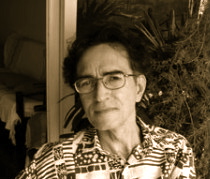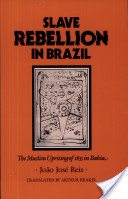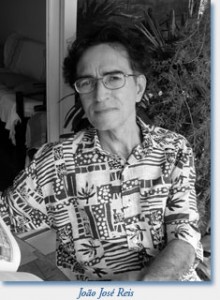Slave Rebellion in Brazi

 Slave Rebellion in Brazil: The Muslim Uprising of 1835 in Bahia by João José Reis, Arthur Brakel (Translator)
Slave Rebellion in Brazil: The Muslim Uprising of 1835 in Bahia by João José Reis, Arthur Brakel (Translator)
The Muslim slave uprising in Bahia in 1835, though unsuccessful in winning freedom for the rebels, had national repercussions, making it the most important urban slave rebellion in the Americas and the only one in which Islam played a major role. Joao Jose Reis draws on hundreds of police and trial records in which Africans, despite obvious intimidation, spoke out about their cultural, social, economic, religious, and domestic lives in Salvador.
 In Conversation with … Joao Jose Reis
In Conversation with … Joao Jose Reis
Sueann Caulfield, January 2008
Joao Jose ReisEditor’s Note: The AHA’s Honorary Foreign Membership, which was first conferred upon Leopold von Ranke in 1886, has since been awarded to 91 other “historians working outside the United States, for their distinguished scholarship and assistance to American scholars working in their country.” At the 122nd annual meeting of the AHA, the distinction was conferred upon João José Reis, a historian at the Federal University of Bahia in Brazil. He is the foremost scholar of the history of slavery and African culture in the Brazilian Northeast, and has been a leading proponent of studying slavery from an Atlantic perspective. He kindly agreed to have an extended e-mail conversation with Sueann Caulfield, associate professor of history at the University of Michigan and a historian of Brazil. We present below the text of their exchanges, which focus on the changing contours of the Brazilian historical profession, and the specific implications of these changes for the study of slavery and Atlantic history.
Sueann Caulfield: You received your PhD at the University of Minnesota in 1982. Why did you choose to study in the United States, and why did you choose that university? How has this choice influenced your subsequent scholarship?
João José Reis: I left Brazil in 1975 partly because of the military dictatorship. Ironically, I went to the United States, whose government supported the dictatorship in Brazil. But it was an interesting, vibrant period, politically and culturally, with the presence of the black-power movement, the pacifist movement, youth counterculture, and the New Left. I used to read many authors associated with such movements; I listened to jazz and soul music. I felt great curiosity about experiencing all of that up close. Regarding academia, I chose the University of Minnesota in response to an invitation from Stuart Schwartz, my adviser, who taught there at the time. I had also been accepted by UCLA and the University of Pittsburgh. At the University of Minnesota, I found the ideal academic environment. At the time, discussions about slavery were hitting a high point with the almost simultaneous publications of Roll, Jordan, Roll by Eugene Genovese, Time on the Cross by Robert Fogel and Stanley Engerman, and The Black Family in Slavery and Freedom by Herbert Gutman. Slavery in Africa was also being studied extensively. The University of Minnesota had an African Peoples Program to which I affiliated myself. There were colleagues in that program who became my friends, and with some I maintain contact up to this day. In addition to Stuart Schwartz, who is a historian of Brazil, Minnesota’s history department included Russell Menard, who studied the colonial Chesapeake Bay; Allen Isaacman, who studied Mozambique; and Lansine Kaba, who studied West Africa. In the area of Spanish America, the department was home to a wizard of quantitative history, Bob McCaa. The debates that flourished in that intellectual environment have influenced my scholarship up to this day.
SC: Was it common for historians of your generation to pursue graduate training outside of Brazil, even when focusing on Brazilian history? Where did Brazilian students tend to study?
JJR: During the time I was in the United States very few Brazilians completed graduate study in history outside Brazil. In Brazil we had a couple of history departments that offered doctoral degrees. The master’s programs—which produced theses of the size and quality of today’s dissertations—were just beginning to expand throughout the country and were still concentrated in the Rio de Janeiro-São Paulo region. Fellowships were rare. The few that left the country rarely went to the United States. The majority went to Europe, particularly France. Some were persecuted politically and were fleeing the dictatorship.
SC: What do you think about young scholars training abroad now, when graduate training in Brazil is so much stronger than it was 25 years ago?
JJR: Today it is a different scenario, not only politically but academically as well. It is not necessary to leave Brazil in order to pursue graduate study. We have strong graduate studies programs in history, perhaps the best system in Latin America with more than 30 doctoral programs, more than 50 master’s programs, an ample network of fellowships, and very competent professionals. Today it is not necessary, and is even undesirable, to leave the country to study the history of Brazil. Unfortunately, it is still necessary to leave the country in order to receive good training in the history of other regions since the majority of our research professors only study Brazil.
SC: The French influence on scholarship and the arts in Brazil has been very powerful. Is this true for the historical profession, and has it changed in recent decades? Do Brazilian scholars still look mostly to Europe and the United States for international collaboration?
https://www.goodreads.com/book/show/99898.Slave_Rebellion_in_Brazil?from_search=true

